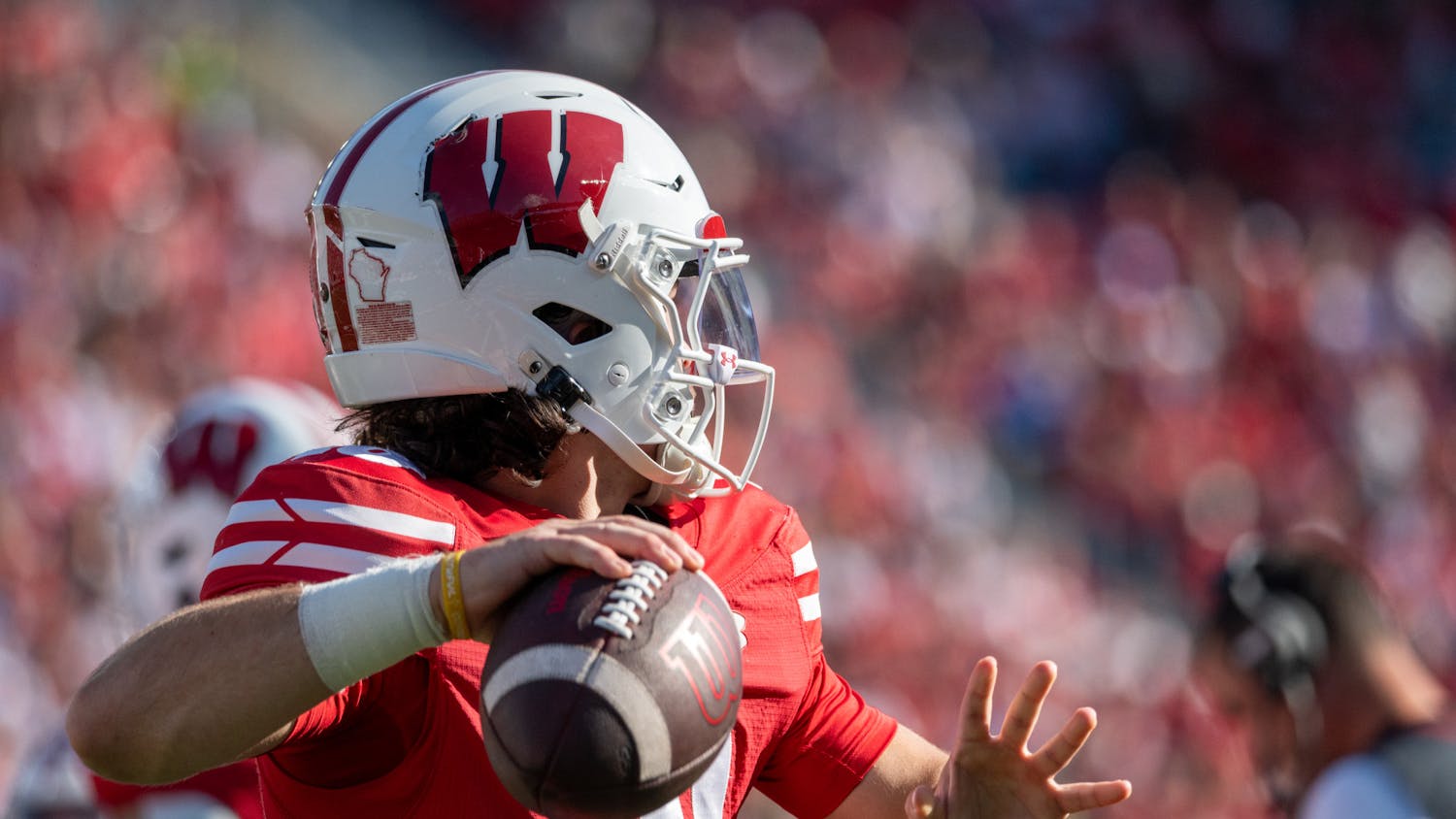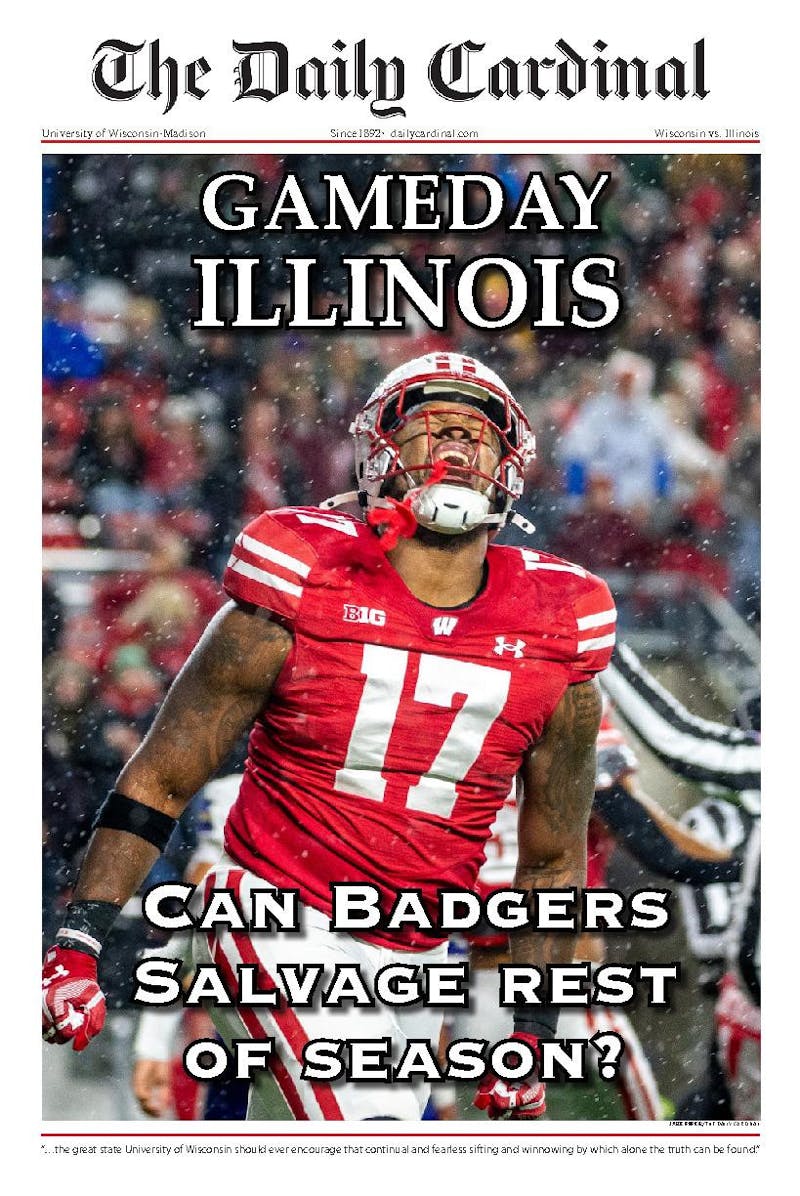Assistant drum major Arista Whitson helps lead the University of Wisconsin-Madison Marching Band in collaboration with drum major Caleb Monge. For every Badger football game played at Camp Randall, the band performs a pregame, halftime and fifth quarter performance celebrating their legendary tradition with energy and precision.
Emphasizing dedication, Whitson took The Daily Cardinal behind-the-scenes to discuss the work behind each performance, her perspective on leading the band and what fans might not see from the stands as the band prepares for the final halftime show of the season Saturday.
This interview has been edited for clarity and brevity.
What does a typical rehearsal week look like?
A typical rehearsal week runs from Tuesday to Friday with practices from 3:30-5:30 every day. If we have a game day on Saturday, we have an early morning rehearsal before the game too. If we have two or three weeks to prepare a show, the first Tuesday is typically a full day of music rehearsal, but if we only have one week we jump right in to working on pregame and halftime.
We also spend time outside of rehearsals picking up our uniforms, charting our parts in our music and practicing on our own if necessary.
Are there any behind-the-scenes traditions that are meaningful?
Right before pregame, when we’re in the tunnel about to head out onto the field, we chant “Eat A Rock” as the drums start the cadence. It’s a saying in the band that means that what we’re about to do is more difficult than eating a rock, and it’s a way to help hype ourselves up for the show.
What role does the drum major play in each show?
The drum major whistles off the start of every show, including run-on during pregame and the step off for halftime. Pregame has a lot of starting and stopping, so whenever we start a new song the drum major re-whistles the start. They also help whistle the band off the field at the cue of our director, and get [the band] into position for [the] fifth quarter.
What is it like performing as assistant drum major and collaborating with the drum major?
I’ve really enjoyed it because it’s nice to work with someone. I think Caleb and I make a great team when we perform together, and having his guidance has been very helpful.
Being a drum major gives a much broader view of the band and I’ve really enjoyed being able to see the big picture because of it. My first year as assistant drum major, I can distinctly remember how I felt the first time seeing everyone run out during pregame. Everyone had a look of determination and passion coming out of the tunnel that you wouldn’t be able to see standing in any other position.
It’s definitely overwhelming and exhilarating. I think the most nerve wracking part is catching the baton during pregame, but it’s also the most rewarding. When performing with the band as a musician, it feels like less of the pressure is on you, but as a drum major it’s much more isolated, so it feels higher stakes in a way.
[Being] drum major is a lot of responsibility to hold, but I had been interested in it since my freshman year. Both of our drum majors then were women, and I remember thinking they were the coolest people in the world. They were definitely part of the inspiration, and I eventually decided to just go for it and see what might happen.
What defines the UW Band’s marching' step?
We call our marching step “stop at the top,” and it’s defined by high knees, parallel shins, a pointed toe and a quick, snappy step when switching feet.
It’s unique to other bands in the snappiness aspect, and most Big Ten bands at least still use a roll step rather than a high step. I may be biased, of course, but our step requires a decent amount of athleticism as compared to other organizations.
What part of marching is most challenging or rewarding, and what do fans tend to overlook?
Getting through run-on during pregame is always a challenge and a test of endurance, but it’s also partially mental. It’s very rewarding to hear the whistle at the end of it and knowing the hard part is over.
I would want [fans] to notice the excitement we have during the shows even when we’re tired. Something that I’m sure gets drowned out in the crowds are the shouts of encouragement we give each other in the middle of shows, but it keeps the energy up for us.
The community within the band is very tight knit, especially within ranks and sections. Since most [members] live together in houses with their instruments, we have a lot of close friendships and connections. I think that helps us on the field because it’s fun to be there with your friends and we all know each other so well.
Do you have a favorite memory from your time with the UW Marching Band?
My favorite memory with the marching band is a pretty recent one. The Badgers have had a difficult season this year, so when we won against Washington at home the field got stormed. Ever since freshman year I had always hoped to see a field storm, so it was incredible for it to finally happen so unexpectedly right at the end of my senior year.
What’s the significance of this last game-day performance for graduating members of the band?
Of course it’s important to everyone, it’s the culmination of the work that we’ve all put in this season to improve ourselves musically and in terms of marching. But for the graduating class it feels like the end of a significant chapter of our lives.
The memories we have associated with the band are essentially endless, and this last gameday marks the end of making those types of memories, so it’s definitely an emotional day.
What would you like to tell those interested in trying out for the band next season?
I would always tell them to go for it.
Our audition process occurs in August, and it involves a week of learning our marching style, called “reg week,” that ends in a formal marching audition. There’s also a music audition that must be submitted for review, and once the audition day is over a list of accepted members is sent out.
It’s rare to find a college organization as large and as closely tied as this one is, and it’s a great opportunity to experience things that no ordinary student would ever get to.






